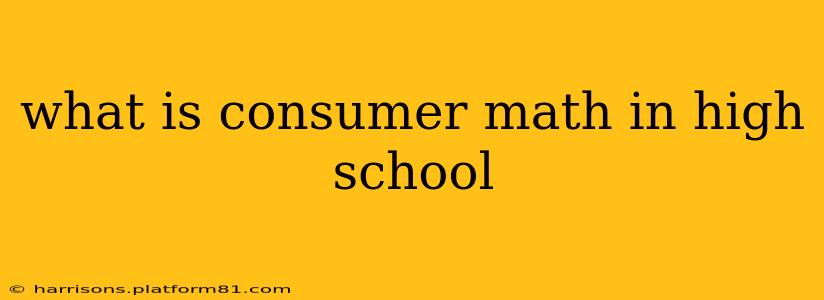Consumer math, also sometimes called applied mathematics, is a high school math course designed to equip students with the practical mathematical skills needed to manage their personal finances effectively. Unlike more abstract math courses like algebra or calculus, consumer math focuses on real-world applications, preparing students for the financial decisions they'll face as adults. This isn't about complex equations; it's about understanding and applying mathematical concepts to everyday financial situations.
What Topics are Covered in Consumer Math?
A typical consumer math curriculum covers a wide range of essential financial topics. These often include:
- Budgeting and Financial Planning: Learning to create and manage a personal budget, track expenses, and plan for long-term financial goals like saving for a down payment on a house or retirement. This often involves understanding different budgeting methods.
- Banking: Understanding checking and savings accounts, interest rates, and fees associated with banking services. Students learn about different types of accounts and how to choose the best one for their needs.
- Credit and Debt Management: This section dives into understanding credit scores, interest rates on loans and credit cards, and the dangers of accumulating high-interest debt. Students learn strategies for responsible credit card usage and debt repayment.
- Investing: A basic introduction to investing, including different investment options like stocks, bonds, and mutual funds. This section usually emphasizes the importance of long-term investing and diversification.
- Taxes: A fundamental understanding of taxes, including income tax, sales tax, and property tax. Students learn how to fill out basic tax forms and understand the impact of taxes on their finances.
- Insurance: Exploring different types of insurance, such as health, auto, and homeowner's insurance, and understanding the importance of insurance in protecting against financial risk.
- Shopping Smart: This involves learning about sales tax, discounts, comparing prices, and understanding unit pricing to make informed purchasing decisions.
What Makes Consumer Math Different from Other Math Courses?
The key difference lies in the application. While other math courses focus on developing abstract mathematical skills, consumer math directly applies those skills to real-life scenarios. The emphasis is less on memorizing formulas and more on understanding the practical implications of mathematical concepts in financial contexts. Problem-solving often involves realistic scenarios, helping students see the immediate relevance of the material.
Is Consumer Math Important?
Absolutely! In today's world, strong financial literacy is crucial. Consumer math equips students with the tools they need to make informed financial decisions, avoid debt traps, and plan for their future. It's a practical skill set that benefits everyone, regardless of their future career path.
What are Some Common Careers that Use Consumer Math Skills?
While not always a directly required course for certain jobs, the skills learned in consumer math are valuable in many careers. These include:
- Financial Advisors: Help individuals and families manage their finances.
- Accountants: Manage financial records for businesses and individuals.
- Bank Tellers: Assist customers with banking transactions.
- Real Estate Agents: Help clients buy and sell properties.
- Insurance Agents: Sell and manage insurance policies.
What if I Don't Take Consumer Math in High School?
If you don't take consumer math in high school, it's not the end of the world. However, you'll likely need to learn these skills independently later in life. Many resources are available, including online courses, books, and workshops, that can teach you the fundamentals of personal finance. It's highly recommended to prioritize learning these essential skills, regardless of whether you took a formal course.
How Can I Learn More About Consumer Math?
Numerous online resources, textbooks, and educational websites offer information on consumer math topics. Libraries are another excellent source of information, offering books and materials on personal finance. Exploring these resources can help you build a solid foundation in financial literacy.
